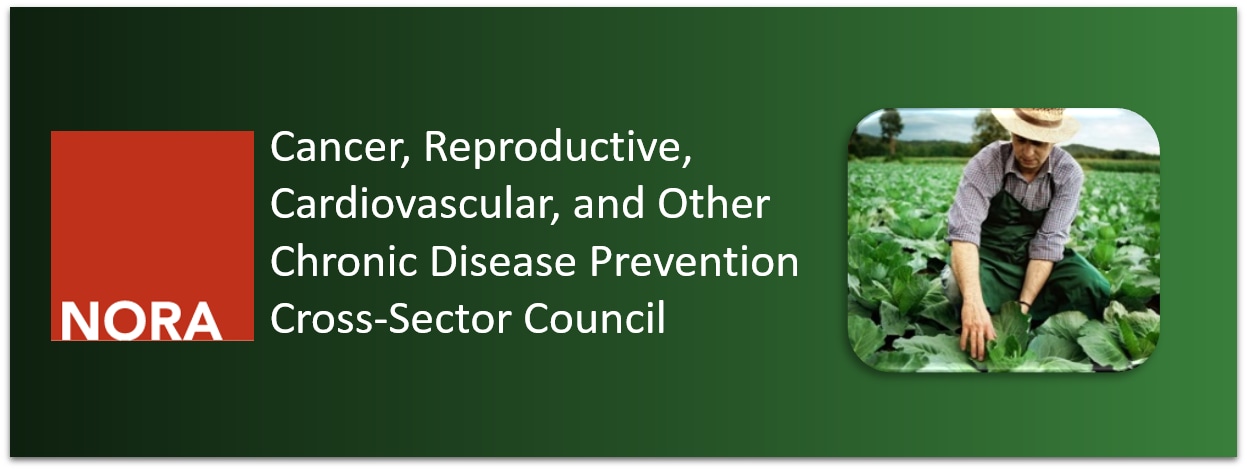Cancer, Reproductive, Cardiovascular, and Other Chronic Disease Prevention (CRC) Cross-Sector Council

The NORA Cancer, Reproductive, Cardiovascular, and Other Chronic Disease Prevention (CRC) Cross-Sector Council brings together individuals and organizations with a shared interested in preventing work-related chronic diseases. CRC Council members share information, form partnerships, and promote adoption and dissemination of solutions that work. Contact the Co-chair or NORA Coordinator to volunteer.
Podcast Series on Workplace Hazards for Pregnant Women
A podcast series on the “Mother to Baby” website was part of a collaboration with the CDC National Center on Birth Defects and Developmental Disabilities and the NORA Chronic Disease Councils. Dr. Jennita Reefhuis (CDC) and Dr. Carissa Rocheleau (NIOSH/NORA) describe workplace exposures that pregnant women may encounter working at:
- Hospitals, veterinary clinics, and airlines
- Nail salons, hair salons and warehouses
- Military and other jobs
Stress Among First Responders
The CRC webinar “Stress and Cardiovascular Disease among First Responders: Data from the BCOPS Study” is now available. Police officers, firefighters, and other first responders encounter stress, shift work, and long hours as part of their job. The Buffalo Cardio-Metabolic Occupational Police Stress (BCOPS) study is a long-term study that looks at the health effects linked to these job-related factors, including outcomes like hypertension, cardiac system dysfunction, and cardiovascular disease. The recorded webinar provides an update on the BCOPS study.
The NORA CRC Council identified research priorities for the third decade of NORA (2016-2026) in the National Occupational Research Agenda for CRC. The agenda identifies 12 research objectives for the nation.
Research objectives for the nation:
Cancer
- Improve the ability to assess the burden associated with occupational cancer.
- Assess the magnitude and characteristics of worker exposures and associated control technologies.
- Conduct analytic epidemiology and toxicology studies of prioritized populations and exposures to identify (or rule out) potential occupational carcinogens.
- Develop laboratory-based research.
- Perform research to investigate the effectiveness of workplace screening for early detection of occupational cancers.
- Develop new methods for and conduct quantitative cancer risk assessments in support of authoritative recommendations for preventing occupational cancers.
Adverse Reproductive Outcomes
- Improve understanding of mechanisms by which hazardous agents and workplace factors are related to adverse reproductive outcomes.
- Improve the efficiency and effectiveness of systems to identify adverse reproductive outcomes, potential workplace risk factors and workers at risk.
- Conduct and communicate studies of exposure and outcome; identify and quantify risk of adverse reproductive health outcomes associated with the workplace.
Cardiovascular Disease (CVD)
- Understand underlying mechanisms for CVD among workers.
- Understand risk factors associated with CVD.
- Develop and evaluate workplace interventions for CVD.
The CRC Cross-Sector addresses many types of health outcomes, including occupational cancers, adverse reproductive outcomes, and cardiovascular disease among workers. It also includes the evolving areas of occupational neurological and renal disease. Workers across many industry sectors are exposed to agents and workplace factors that may be carcinogens. They may also contribute to adverse reproductive outcomes such as
- birth defects
- developmental disorders
- spontaneous abortion
- low birth weight
- preterm birth.
Occupational risks for cardiovascular disease are not well understood yet. Evidence suggests that some toxins may contribute. Non-chemical workplace factors such as physical exertion, shift work, and psychosocial factors (e.g. job strain and other job stressors) may also play a role.
The NIOSH CRC Program facilitates the work of the Council and coordinates NIOSH research in this cross-sector.